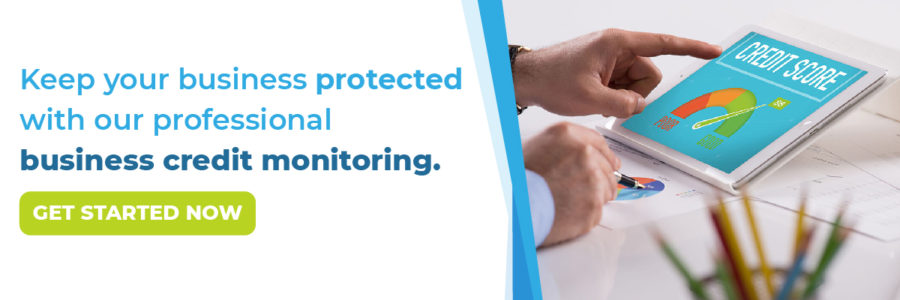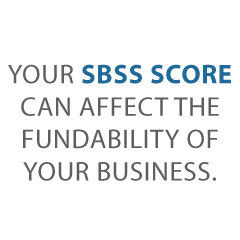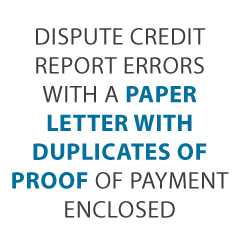
SBSS Score and Fundability: When Two Worlds Collide
You already know your credit scores, both personal and business, affect fundability. But did you know that there is one business credit score that uses not only both business and personal credit history, but other information as well. It gives lenders a much broader picture when it comes to fundability. You need to understand how your SBSS score can affect the fundability of your business.
How your SBSS Score Fits into Fundability
There are many factors to consider when it comes to small business financing. You need your credit in order, you have to have complete financial statements, and beyond that there are many other things that affect the fundability of your business.
The business credit score is what often causes issues. Sometimes the business credit score is bad, but just as often it is nonexistent. No credit score is pretty much the same as a bad credit score. That isn’t the end of the story for most borrowers however. This is why the FICO SBSS has become so popular.
Keep your business protected with our professional business credit monitoring.
SBSS Score: What Is It?
The FICO SBSS is the business version of your personal FICO credit score. It is becoming more common for lenders to use this score, rather than the Experian business credit score or even the D&B PAYDEX. It stands for FICO Liquid Credit Small Business Scoring Service.
Unlike your personal FICO, the SBSS reports on a scale of 0 to 300. The higher the score the better. But most lenders demand a score of at least 160.
SBSS Score: How Is It Calculated
The scoring model for this score is very different than other business credit scoring models. Honestly, it actually gives a better picture of overall fundability in some ways. This is because it uses your business and personal credit scores. Also, financial information like business assets and revenue come into play. The point of the SBSS sore is to give a picture of total fundability in one score.
Business owners cannot access this score themselves. The formula for calculations is proprietary and well-guarded by FICO. They do not make the information public. When you go to a lender, you go in blind about what your score may be. In contrast, with the other credit agencies you can actually get a copy of your credit report and know where you stand.
The reason this does not work the same way is surprising to many. The truth is, you could have a different score from lender to lender. This is because of how lenders request your score.
SBSS Score: How Lenders Get Your Score
The process starts when you turn in your application. It will include all the financial information the lender requires. Then the lender will process the information and send it to FICO with a request for your SBSS score. At this point, the lender can ask for certain factors in the score to carry more weight than others. For example, they can put more weight on your personal credit than your business credit. They could choose to weigh annual revenue as more important than payment history. It is their choice. This is why your FICO business score could vary between lenders.
SBSS Score: What Does FICO Do with the Request? 
First, they get the request from the lender. They then search business credit information from business CRAs. These include D&B, Experian, and Equifax. If they cannot pull enough scoring information from one, they move onto the next. If there is not enough data from any of them, then it uses personal credit and business financials only.
With the lender’s weighting preferences, personal credit, business credit, and business financial data, they calculate the score. The information is specific to that lender.
Who Uses the SBSS Score?
These days, the SBSS score is becoming more and more popular among lenders that lend to businesses. It is more comprehensive and complete than the other scoring models. This is because it considers more than past payment information from the business.
Lenders know that there is more to fundability than credit score alone. With SBSS, FICO does the work of piecing together the whole picture for them. This isn’t always a bad thing, unless you are counting on your bad personal credit not being an issue when applying for a business loan. In fact, it can actually help you if you have no business credit. Other than the fact that the highest score possible with no business credit is 140. That is far below the 160 most lenders require.
For now, you need to know that many lenders use this score, and the number is growing. In addition, the Small Business Administration uses it as a pre-screener for its popular 7 (a) loans. The SBA does not itself lend money, but rather it backs certain loans through select lenders. It sets a minimum SBSS score of 140 to be eligible for a 7(a) loan.
That means if you want this type of loan, you must have a minimum SBSS of 140 before you are even eligible to apply. It is possible to get this type of loan with a score above 140 but lower than the typically required 160. The backing of the SBA reduces the lender’s risk.
FICO SBSS and Overall Fundability
While this score gives a more complete picture of overall fundability than other business credit scores, it still doesn’t necessarily tell the whole story. Here is how each element of fundability comes into play for your SBSS score.
Business Credit Reports
These are the credit reports, much like your consumer credit report, that detail the credit history of your business. It is a tool to help lenders determine how credit worthy your business is.
These come from a number of agencies, but the main three are Dun & Bradstreet, Experian, Equifax. FICO searches business credit information from these agencies when compiling your score for SBSS. That means, you need to ensure your information with these companies is as complete and accurate as possible. Business credit monitoring is essential. Another key point here is to ensure your business is set up to be fundable in the first place. If not, there won’t be a lot for FICO to get from these agencies anyway.
Keep your business protected with our professional business credit monitoring.
Other Business Data Agencies
In addition to the business credit reporting agencies that directly calculate and issue credit reports, there are other business data agencies that affect those reports indirectly. Two examples of this are LexisNexis and The Small Business Finance Exchange. These two agencies gather data from a variety of sources, including public records. This means they could even have access to information relating to automobile accidents and liens. While you may not be able to access or change the data these agencies have on your business, you can ensure that any new information they receive is positive. Enough positive information can help counteract any negative information from the past.
Since these agencies indirectly affect reports that FICO uses when calculating your SBSS score, they make a difference.
Identification Numbers
In addition to the EIN, there are identifying numbers that go along with your business credit reports. You need to be aware that these numbers exist. Some of them are simply assigned by the agency, like the Experian BIN. One, however, you have to apply to get. It is absolutely necessary that you do this.
Dun & Bradstreet is the largest and most commonly used business credit reporting agency. Every credit file in their database has a D-U-N-S number. To get a D-U-N-S number, you have to apply for one through the D&B website. If you don’t have a score with D&B, you might as well not have a business credit score. As already mentioned, FICO uses D&B information as well as information from other business credit agencies.
Business Credit History
Your credit history is the crux of what makes up your business credit score, and your business credit score is a big part of your score from FICO SBSS, though how much it matters depends on how the lender requests it be weighted.
Your credit history consists of a number of things including:
- How many accounts are reporting payments?
- How long have you had each account?
- What type of accounts are they?
- How much credit are you using on each account versus how much is available?
- Are you making your payments on these accounts consistently on-time?
The more accounts you have reporting on-time payments, the stronger your credit score will be.
Business Information
On the surface, it seems obvious that all of your business information should be the same across the board everywhere you use it. However, when you start changing things up like adding a business phone number and address or incorporating, you may find that some things slip through the cracks.
This is a problem because a ton of loan applications are turned down each year due to fraud concerns simply because things do not match up. Maybe your business licenses have your personal address but now you have a business address. You have to change it. Perhaps some of your credit accounts have a slightly different name or a different phone number listed than what is on your loan application. Do your insurances all have the correct information? Monitoring is key for this factor as well.
This is one of those elements of fundability that lenders may use in conjunction with a credit score. It doesn’t necessarily affect the score itself, but if can definitely affect whether or not you get approval.
Financial Statements
While the FICO formula is proprietary, many sources state that, if available, information from financial statements is used in the calculation of your SBSS score. This encompasses a broad spectrum of things. First, there is the obvious. Both your personal and business tax returns need to be in order. Not only that, but you need to be paying your taxes, both business and personal.
Regardless of whether they are used in the calculation of the score however, the information on these statements definitely affects your fundability.
Bureaus
There are several other agencies that hold information related to your personal finances that you need to know about. The data these bureaus hold affects fundability.
Take ChexSystems for example. In the simplest terms, they keep up with bad check activity that affects your bank score. If you have too many bad checks, you will not be able to open a bank account. That will cause serious fundability issues.
For this point, everything comes into play. Have you ever been convicted of a crime? Do you have a bankruptcy or short sell on your record? How about liens or UCC filings? All of this can and will play into the fundability of your business.
While these factors are unlikely to figure into your FICO SBSS directly, they do, along with your credit score, affect fundability.
Keep your business protected with our professional business credit monitoring.
Personal Credit History
Your personal credit score from Experian, Equifax, and Transunion definitely directly affect your SBSS score. If there is a problem somewhere, get to work on it. The number one way to get a strong personal credit score or improve a weak one is to make payments consistently on time.
Also, make sure you monitor your personal credit regularly to ensure mistakes are corrected and that there are no fraudulent accounts being reported.
The Application Process
The loan application process itself can affect fundability also. First, consider the timing of the application. Is there any part of overall fundability you need to work on before you apply? Next, ensure that your business name, business address, and ownership status are all verifiable. Lenders will check this. Lastly, make sure you choose the right lending product for your business and your needs. Do you need a traditional loan or a line of credit? Would a working capital loan or expansion loan work best for your needs? If you are applying for a product that won’t serve your purpose, it doesn’t matter if you get it or not.
SBSS Score: It’s a Mystery
The fact is, you do not and cannot know what your score from FICO SBSS will be. There are too many variables in play. What you can do though, is get a good overall idea of your fundability based on what you know about the factors that affect it. Once you have this, you can be sure your score from FICO SBSS will reflect it accurately.
The post SBSS Score and Fundability: When Two Worlds Collide appeared first on Credit Suite.


